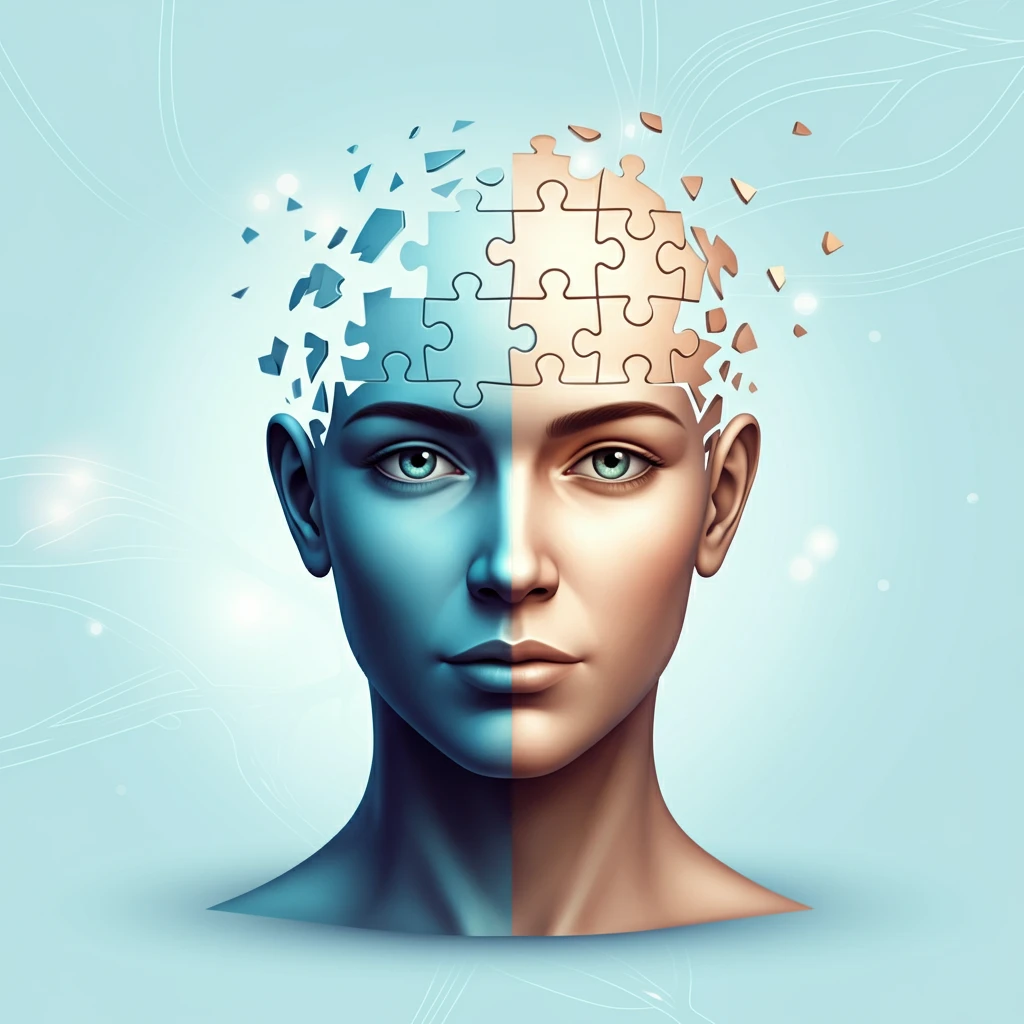Introduction
Schizophrenia is a chronic and severe mental health condition that impacts how a person thinks, feels, and behaves. It often causes individuals to lose touch with reality, leading to symptoms such as hallucinations, delusions, and disorganized thinking. Despite affecting millions of people worldwide, schizophrenia remains one of the most misunderstood mental illnesses, frequently surrounded by stigma and misinformation. However, with early diagnosis and appropriate treatment, individuals with schizophrenia can experience significantly improved outcomes and regain stability in their lives.
Nirmal Hospital’s Schizophrenia Rehabilitation Centre is a beacon of hope for individuals living with schizophrenia. Dedicated to providing comprehensive and compassionate care, the center focuses on addressing the unique needs of each patient. It is renowned for its expertise in the early detection and diagnosis of schizophrenia, as well as its robust rehabilitation programs designed to aid recovery and enhance quality of life. By offering a holistic approach to treatment that includes medication management, therapy, and life skills training, Nirmal Hospital is committed to empowering patients and their families to overcome the challenges posed by schizophrenia.
Signs and Symptoms of Schizophrenia

Schizophrenia is a complex mental health condition characterized by a range of symptoms that are typically categorized as positive, negative, or cognitive. Understanding these symptoms is vital for early detection and effective management.
Positive Symptoms
Positive symptoms refer to behaviors or experiences that are added to an individual’s normal functioning and are often the most noticeable signs of schizophrenia. Hallucinations are a common positive symptom, where individuals perceive something that is not actually present; for example, hearing voices that others cannot hear. These auditory hallucinations are particularly distressing and can interfere with daily life. Delusions are another hallmark feature, involving strongly held false beliefs that defy reality or logic. A person may, for instance, believe they are being watched or persecuted by others, even in the face of contradictory evidence. Disorganized thinking often accompanies these symptoms, making communication fragmented or incoherent. For example, an individual may struggle to maintain a logical flow of conversation, jumping between unrelated topics, which can create significant challenges in social interactions.
Negative Symptoms
Negative symptoms are characterized by the absence or reduction of normal emotional and behavioral functions. Affective flattening, or diminished emotional expression, is commonly observed, where individuals may show little to no facial expression and speak in a monotone voice. Avolition, another significant symptom, refers to a lack of motivation or initiative, making even routine tasks overwhelming. Additionally, anhedonia, or the inability to experience pleasure, often leads individuals to withdraw from activities they once enjoyed. These symptoms are frequently subtle and may be misunderstood as laziness or disinterest, complicating the diagnostic process.
Cognitive Symptoms
Cognitive symptoms affect mental processes such as memory, attention, and executive functioning, making it difficult for individuals to complete everyday tasks. Memory issues can result in forgetting important appointments or misplacing essential items frequently. Impaired attention limits an individual’s ability to concentrate on tasks, while challenges in executive functioning hinder their problem-solving and decision-making skills. These cognitive deficits significantly disrupt daily life, impacting work, relationships, and overall independence.
Understanding these symptoms helps pave the way for compassionate care and effective treatment plans tailored to the specific needs of each patient.
Early Warning Signs of Schizophrenia
Changes in Behavior and Mood
One of the earliest signs of schizophrenia often includes noticeable changes in behavior and mood. Individuals may begin to withdraw from social interactions, avoiding friends, family, or activities they once enjoyed. Irritability or unusual emotional responses could become apparent, along with neglecting personal hygiene or appearance. These subtle but significant shifts are often overlooked but can indicate the onset of a deeper underlying condition.
Unusual Thoughts or Beliefs
Schizophrenia may also manifest in the form of strange or irrational beliefs. For example, an individual might express that they have unique powers or special knowledge that others do not possess. Alternatively, they may develop paranoid thoughts, such as believing they are being watched or followed. These ideations are often accompanied by an increasing dissociation from reality.
Cognitive Decline
Cognitive difficulties are another hallmark of early schizophrenia. Individuals may start struggling with memory, concentration, or staying focused on tasks, which can disrupt their ability to function effectively day-to-day. This decline might initially present itself as forgetfulness, trouble making decisions, or an inability to follow through with plans and responsibilities.
Impact on Relationships and Work/School
The early stages of schizophrenia can significantly impact a person’s ability to maintain healthy relationships or meet their responsibilities at school or work. Social withdrawal or erratic behavior might lead to strained connections with loved ones, while declining cognitive abilities and unusual behavior can make meeting professional or academic demands increasingly difficult.
Nirmal Hospital’s Role in Recognizing Early Signs
At Nirmal Hospital’s Schizophrenia Rehabilitation Centre, we are dedicated to identifying the early warning signs of schizophrenia and providing timely intervention. Our team of experts focuses on early diagnosis and personalized treatment plans, aiming to address symptoms before they escalate. Through compassionate care and evidence-based practices, we are committed to improving patient outcomes and ensuring a brighter future for those affected.
Understanding the Causes and Risk Factors

Genetic Factors
Research has shown that genetic predisposition plays a significant role in the development of schizophrenia. Individuals with a first-degree relative, such as a parent or sibling, diagnosed with schizophrenia are at a higher risk of developing the disorder. This suggests that inherited genetic variations can contribute to susceptibility, although genetic risk alone is not deterministic.
Environmental Factors
Environmental influences, such as high levels of stress, exposure to trauma during childhood, substance abuse, or significant life changes, may trigger the onset of schizophrenia in susceptible individuals. These factors can interact with genetic predispositions, potentially exacerbating symptoms or accelerating the disorder’s progression.
Neurobiological and Brain Structure Changes
Studies have identified structural and functional brain changes in individuals with schizophrenia, including differences in brain volume and disrupted neural connections. Chemical imbalances, particularly involving neurotransmitters like dopamine and glutamate, are also thought to play a critical role. Ongoing research continues to enhance our understanding of how these biological factors contribute to the disorder.
Nirmal Hospital’s Comprehensive Approach
At Nirmal Hospital’s Schizophrenia Rehabilitation Centre, we prioritize a holistic understanding of schizophrenia through comprehensive assessments. Our experts carefully evaluate both genetic predispositions and environmental factors to develop tailored treatment plans. By addressing these complex, interwoven causes, our approach aims to provide multidimensional care and foster recovery for every patient.
Treatment and Rehabilitation Options at Nirmal Hospital
At Nirmal Hospital’s Schizophrenia Rehabilitation Centre, we provide a comprehensive range of treatment and rehabilitation options tailored to meet the unique needs of each patient.
Medication Management (Antipsychotics):
Effective management of schizophrenia often begins with the use of antipsychotic medications, which help control symptoms such as hallucinations, delusions, and disorganized thinking. At Nirmal Hospital, our experienced psychiatrists carefully monitor and adjust medications to ensure the best outcomes while minimizing potential side effects. Patient education about medication adherence is prioritized to enhance long-term treatment success.
Psychotherapy and Counseling:
Nirmal Hospital offers a variety of evidence-based psychotherapy options to address the psychological aspects of schizophrenia. Cognitive Behavioral Therapy (CBT) is employed to help patients identify and manage negative thought patterns. Individual counseling provides a safe space for personal exploration, while group therapy fosters social connections and shared experiences among patients. These therapies are designed to build coping mechanisms and improve overall emotional well-being.
Rehabilitation and Social Support:
Recognizing the importance of reintegration into society, Nirmal Hospital focuses on rehabilitation programs that promote independence and functionality. Vocational training programs equip patients with skills for meaningful employment, and social skills training fosters better interpersonal relationships. Family counseling sessions are also conducted to strengthen support systems and enhance understanding of the disorder.
Holistic and Complementary Therapies:
To support overall mental and physical well-being, Nirmal Hospital incorporates holistic approaches such as stress management techniques, yoga, and mindfulness practices. These therapies work in tandem with conventional treatments to enhance relaxation, reduce stress, and improve quality of life.
Ongoing Monitoring and Support:
Long-term care is a pillar of our treatment philosophy. Continuous monitoring of patient progress allows our team to make adjustments to treatment plans as needed, ensuring sustained recovery. Regular follow-ups, support groups, and access to crisis intervention services reflect Nirmal Hospital’s unwavering commitment to the ongoing well-being of every patient.
Support for Families and Loved Ones
At Nirmal Hospital, we recognize that the impact of schizophrenia extends beyond the individual to their family and loved ones. To address this, we offer comprehensive educational support to help families understand schizophrenia, its symptoms, and effective ways to provide care and encouragement. By equipping family members with knowledge, we empower them to play an active and informed role in their loved one’s recovery.
Family Counseling and Group Therapy
Family counseling and group therapy are key components of our care approach. These services provide a safe space for families to express their emotions, share experiences, and learn strategies to cope with the challenges of caregiving. Working together, family members can build stronger relationships, reduce emotional strain, and foster a supportive home environment.
Nirmal Hospital’s Family-Focused Approach
Nirmal Hospital adopts a family-inclusive treatment philosophy, understanding the vital role loved ones play in long-term recovery. Through guidance, regular communication, and structured involvement in the care plan, we ensure families are supported every step of the way. By addressing the concerns of patients and their families, we aim to create a holistic and sustainable recovery process.
Taking the First Step Towards Recovery
Recognizing the early signs of schizophrenia and seeking timely intervention can make a significant difference in achieving better outcomes. Early action not only improves the effectiveness of treatment but also helps patients regain control over their lives and maintain strong connections with their loved ones. At Nirmal Hospital’s schizophrenia specialists, we are committed to providing compassionate, comprehensive care tailored to the unique needs of each patient. Our holistic approach focuses on long-term recovery, helping individuals improve their quality of life and build a positive future. If you or someone you care about is showing signs of schizophrenia, don’t wait to seek help. Contact Nirmal Hospital today for more information or to schedule an assessment. Together, we can take the first steps toward brighter days.









Leave a Reply